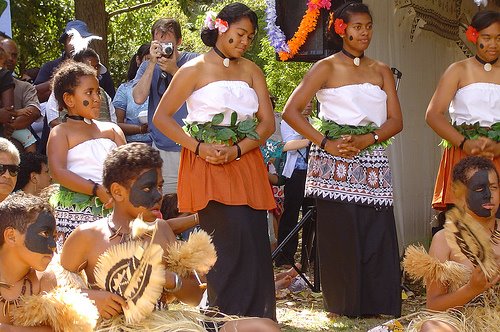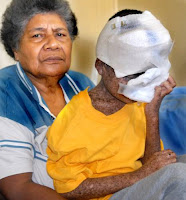
BETANI Salusalu is somewhat of a celebrity in the stunning Mamanuca group of tropical islands. Every island he lands on sees staff provide him a homecoming welcome, not to mention a ready bed and breakfast.
It's a relationship that has taken several years in the making, but one which has become crucial to the future that resort and resource owners in these islands envision for themselves.
Salusalu is the coordinator of the Mamanuca Environment Society, a non-profit organisation formed in 2002 "to address environmental issues in the region and specifically work towards the betterment of the region's marine and terrestrial environment".
His work takes him across the spectacular chain of tropical islands scattered to the west of Fiji, visiting resorts, landowners and staff villages, with the chief goal being education and dialogue, along with environmental monitoring.
It's a role that was created by the resorts he visits, all of whom are members of the Mamanuca Fiji Islands Hotel and Tourism Association (MFIHTA) which founded MES. On any given day Salusalu and his team could be either monitoring water quality, surveying a reef system, advising resorts how to manage liquid waste, teaching villagers about composting or talking to land owners about a fishing "tabu" or ban.
It all depends on the needs of a particular site or community. The waters and reef systems around the Mamanucas, Salusalu says, are like the lungs of the west. "We sit around a bay that receives a lot of the runoff from activities in the west of Viti Levu. So we are vulnerable to sedimentation and a lot of waste from human activity is flushed into the area".
With the tourism industry in the area heavily reliant on the spectacular natural beauty of the Mamanucas, it makes sense that owners, workers and visitors take a wholistic approach to environmental protection there. What's been even more fulfilling, Salusalu says, is the support that MES has received financially through sponsorships.
Over the weekend, ANZ Bank's Fiji head Robert Bell handed the group a $25,000 cheque to help continue the environmental work in the area. It's the third time the bank, which is the Gold Sponsor of the program, has provided financial support to the body.
Bell says a big part of the reason for their support is that MES is concerned with creating a better future for Fiji and that it has a lot to do with education - which over the long term should have a wider impact than just policing of environment issues.
"Businesses need to have a broader reach and this program is particularly important because it's about Fiji's future. I've been on Castaway Island for 35 minutes and 35 days of stress just washed away. It's an indication of what tourists to the area can expect, and the environment is a major part of that success formula," Bell says.
MES treasurer Ronnie Chang - who represents Pacific Island Air on the executive committee - says the support of corporates such as ANZ, and silver sponsors AON Risk Services, as well as members spread throughout the Mamanucas, keep the environment in focus.
Salusalu and his team - which includes project assistant Fesi Isimeli, project officer Diana Nagatalevu and volunteer Kenneth Cokanasiga - are kept busy all year round focusing on bettering the environment in the islands.
They travel to four schools in the area providing children with the basics on coral reefs, coral biology and ecology, and teaching kids how to conduct basic reef surveys. They carry out best practice training for watersports activities staff in resorts - providing theory and practical education designed to make staff more environmentally savvy. One ongoing initiative is the bid to eradicate the crown of thorns starfish from the area because it is a coral predator. These are removed from the waters in the area
Twice a year they also conduct water quality analysis from the Nadi Bay area through to Lautoka Wharf, testing for nitrates and phosphates that might encourage the deadly algal blooms that could devastate the Mamanuca ecology.
Their busy program includes turtle conservation, including educating villagers in the area about how to protect turtles and turtle nesting sites. The region has also had one turtle released into the wild which has been satellite tagged, allowing resorts to receive updates of her travels around Fiji and the region. One area of major importance considering the tourism focus of the region is maintaining the health of coral reefs, which are a magnet for spectacular diving and snorkelling.
Part of this process is a drive to restore giant clam populations in the area, because clams are helpful for the development of reef.
Salusalu says mini clam nurseries sites are present at
Castaway Island, Tokoriki Reef, Elevuka Reef, Qalito House Reef, and Solevu village house reef. The group also facilitates a Reef Check program which sees 18 separate sites undergo regular checks through trained volunteers. Castaway Island Resort operations manager Steven Andrews says guests are increasingly keen to help preserve the "paradise" they have come to love.
One of the more successful initiatives has been Castaway's Kids Sea Camp where children are educated on the marine environment - and parents more often than not join in.
Environmental issues in the Mamanucas are increasingly recognised as being not just crucial for everyday business, but for the very survival of the way of life of people who live and visit there.
Integrating the two now with the support of industry-led initiatives such as MES means paradise can remain uninterrupted for generations to come.
Adpted from Fijitimes Online
 He loves village life. Staying among the villagers in Nadrau up in Nadarivatu is the best thing that has ever happened to him. Ronil Singh, a primary school teacher at Nadrau Fijian School never regretted being posted to the interior of Viti Levu.
He loves village life. Staying among the villagers in Nadrau up in Nadarivatu is the best thing that has ever happened to him. Ronil Singh, a primary school teacher at Nadrau Fijian School never regretted being posted to the interior of Viti Levu. 


